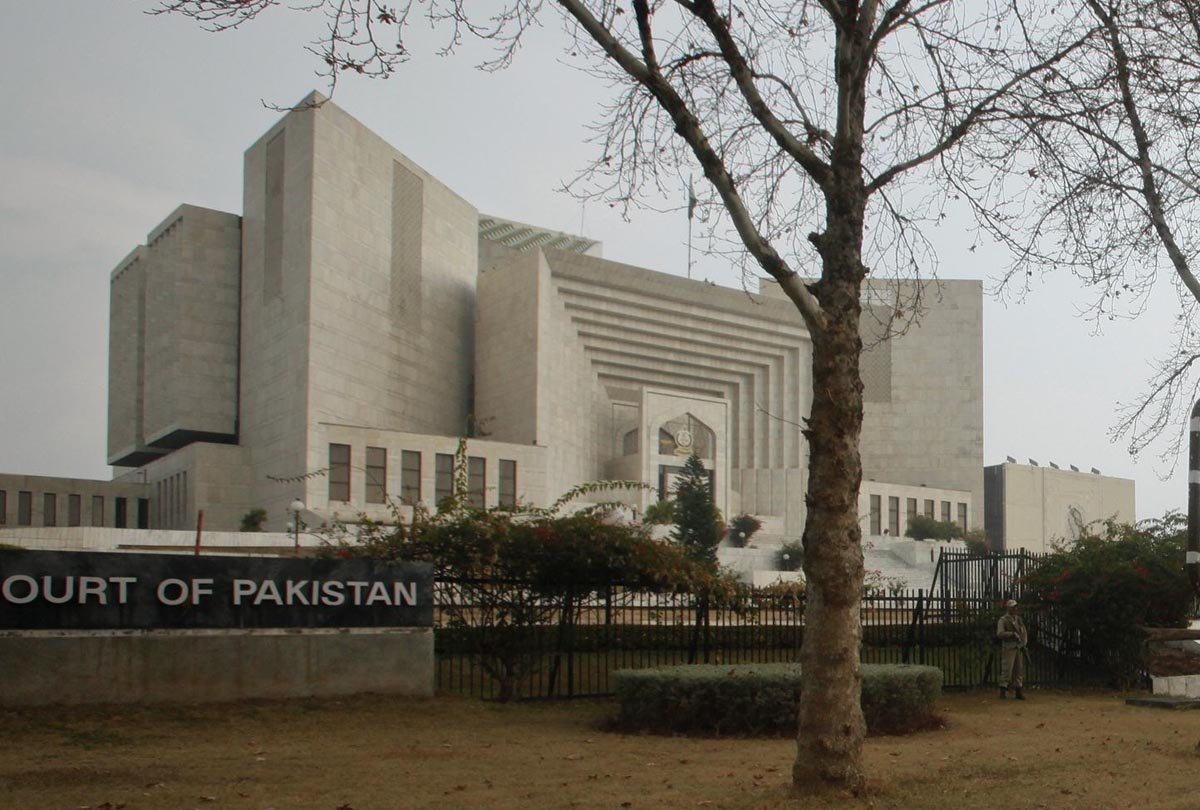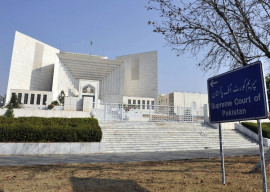
The Supreme Court on Saturday held that the tax tribunals must proceed ex-parte to decide the cases on the basis of available records rather than dismissing them on the basis of non-prosecution.
The top court struck down Appellate Tribunal Inland Revenue Rules, 2010 as being ultra vires section 132(2) of the Income Tax Ordinance 2001.
In a seven-paged judgment authored by Justice Syed Mansoor Ali Shah while hearing an appeal in a tax matter, the apex court noted that Section 132(2) does not encourage adjournments by the parties, ruling that the tribunal can proceed ex-parte if any of the parties is found to be “in default” on the date of hearing.
It explained that “in default” meant the absence of a party without a sufficient cause on any date fixed for hearing.
A division bench of the apex court led by Chief Justice of Pakistan Umar Ata Bandial heard the matter.
The judgement said that Section 132(2) of the ordinance said that the tribunal may proceed ex parte to decide the appeal on the basis of the available record. On the other hand, Rule 22(1) stipulates that the tribunal may if it deems fit, dismiss the appeal or application in default.
Justice Shah noted that section 132(2) of the ordinance is far more detailed, explicit, direct and clear compared to Section 33(4) of the Income Tax Act, 1922.
Therefore, the order said, it is underlined that the logic and rationale behind Section 132(2) of the ordinance and the consistent jurisprudence evolved over the years around Section 33(4) of the erstwhile tax law is to promote and support an efficient tax administration and encourages smart tax governance in the country.
"Re-engineering the litigative process and procedure by removing dilatory steps in the dispute resolution mechanism is a welcome development."
The court also noted that the order of dismissal of the appeal on the ground of default gives rise to a new set of litigation on a technical issue totally unrelated to the tax controversy at hand.
The judgement further explained that any further proceedings against the order of dismissal are a futile exercise for a tax collector, as well as, the taxpayer, as the real tax dispute goes unattended till such time that the parties settle the issue of dismissal in default from the highest court in the land.
"The parties if successful have to start all over again before the Tribunal on merits. Section 132(2) avoids this double exercise and mandates that the appeal be decided on merits so that any further proceedings before a higher forum lead to a decision on merits.
The judgment said that these unnecessary delays in tax dispute resolution seriously impair the overall tax governance in the country, which rests on efficient tax management and speedy tax collection.
"Section 132(2) of the Ordinance has no appetite for delays and penalizes the indolent party by empowering the tribunal to proceed ex-parte on the basis of the available record.”
It is also to be noted that section 132(2) does not encourage adjournments by the parties.
"The tribunal can proceed ex-parte if any of the parties is in default on the date of hearing. “In the default” means the absence of a party without a sufficient cause on any date fixed for hearing.
"For the reasons elaborated above, we hold and declare that Rule 22(1) of the Rules to the extent whereby it allows the tribunal to dismiss an appeal in default is ultra vires Section 132(2) of the ordinance and is, therefore, struck down to that extent."
The apex court directed its office to dispatch copies of the judgment to the federal government through the secretary ministry of finance, revenue division Islamabad and to the Federal Board of Revenue (FBR) through its chairman, for information and compliance.
‘Long-lasting effect'
Commenting on the judgment, tax law expert Hafiz Ahsaan Ahmad Khokhar said that the present judgment of the top court would have a long-lasting effect on the tax adjudication system in Pakistan, especially on the working and adjudication of the appellate tribunal with the present clear-cut observation, and the tax cases would be decided in future if not represented by any side on the available record and would not be dismissed merely in default of non-represented by either side but would be decided on merits and on the available record with the tribunal.
The tax expert said that the present judgment of the Supreme Court would rectify the delayed period of adjudication consumed unnecessarily in litigation on technical grounds and further would bind the tax tribunal to decide the case on all points available on record with them/
Khokhar said that the Supreme Court has very delicately interpreted the intent and spirit of Section 132(2) of the income tax Ordinance 2001 and rule 22(1) of the Income tax Rules and has rightly declared and struck down that Rule 22(1) of to the extent whereby it allows the Appellate Tribunal to dismiss an appeal or application in default is ultra vires to Section 132(2) of the Ordinance 2001.
He also said that Supreme Court has mainly relied on two legal points; namely that instead of going into the technicalities of law or rules for deciding a tax case, it should be decided by the appellate tribunal being the highest fact adjudication forum under the Income Tax Ordinance 2001 on merits and on the available record with them for avoiding further delay in final adjudication.
Secondly, the anoted point the apex court’s ruling relied on was that that it was a trite law that rules cannot override the specific provisions of the parent statute, and the rules are to carry out the purposes of the ordinance and cannot offend, oppose or be inconsistent with the provisions of the parent statute or ordinance, which is missing in the present case with reference to Section 132(2) of the Ordinance 2001.


1732184775-0/BeFunky-collage-(80)1732184775-0-165x106.webp)

1731933289-0/BeFunky-collage-(68)1731933289-0-165x106.webp)


1732179298-0/BeFunk_§_]__-(23)1732179298-0.jpg)

1732181665-0/Express-Tribune-(9)1732181665-0-270x192.webp)
1732178966-0/BeFunk_§_]__-(22)1732178966-0.jpg)
1732178488-0/Express-Tribune-(7)1732178488-0-270x192.webp)









COMMENTS
Comments are moderated and generally will be posted if they are on-topic and not abusive.
For more information, please see our Comments FAQ